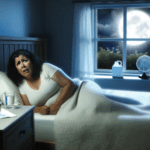Explanations for fatigue and energy levels in perimenopause and menopause.
You used to be an awesome sleeper, the type of woman that could sleep through just about anything and have felt well rested in the day.. But now, in your transitioning years, things have become different. You find that on days when you sleep less, it’s really hard to make up for the lost hours. And on top you got plagued with further serious sleep problems that come with perimenopause and menopause.
Why’s that? A lot of the energy exhaustion and sleeplessness are due hormonal changes and due to routines that we have established for years.
Let’s start with the routines. Multi-tasking, grabbing food on the run, running errands or chauffeuring when not working, returning emails between 9 pm and 11 pm, grabbing the one hour of rest before midnight bedtime and then getting up again at 6:30 am to start the day. Oh, and lots and lots of coffee. Your adrenal glands – that help you run on empty – have had to step up to the plate and perform overtime. The fact of the matter is that they don’t function as well in perimenopause and menopause. The adrenal glands help handle stress and produce important sex hormones, as well as cortisol, melatonin and adrenalin. As the ovaries start to shut down causing a decline of sex hormones, the adrenals have to make up for the slack. These adrenals get tired of doing the hormone balancing and begin to shut down if they’re working too hard.
This takes us to the hormonal changes. As women age, they enter a stage of a general hormonal depletion. During menopause, you need your adrenal glands to be healthy. Adrenal fatigue is still not a condition recognized widely by the medical community. However, most women in their 40s and 50s need some form of adrenal support. It only makes sense, given busy lifestyles and all the stressors of modern life.
Here are some symptoms of adrenal fatigue:
- Waking up at night
- Being unable to fall asleep
- Not feeling rested after you wake up in the morning
- Weight gain, especially around the middle
- Low libido, low energy
Lifestyle changes are always the most important ones you can make. It’s hard though to have the discipline to do all the things that everyone tells us to do. How many times have you heard the following 10 tips or read about them in articles?
- Practice self-care.
- Don’t over-commit.
- Go to bed before midnight.
- Unplug at night and avoid electronics in the bedroom.
- Stop propping up your adrenals with caffeine and sugar, which just give you a temporary fix.
- Eat protein and healthy snacks like nuts throughout the day to give you energy.
- Practice yoga.
- Go for a long walk and embrace nature.
- Meditate or at least take a break throughout your day.
- Avoid strenuous exercise especially at bedtime.
There’s always room for behavioral and lifestyle improvement and it will come gradually. The better your health is in perimenopause, the more energy and hormonal balance you will have in menopause.
Scientific article:
http://journals.lww.com/menopausejournal/Fulltext/2006/13020/Increased_urinary_cortisol_levels_during_the.12.aspx








